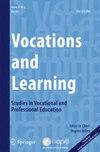阐述工人学习、创新与幸福感之间的关系
IF 1.8
2区 教育学
Q2 EDUCATION & EDUCATIONAL RESEARCH
引用次数: 0
摘要
阐述工人的学习、创新和幸福感之间的关系对于实现当代工作生活中的两个重要和双重目标至关重要。首先,个人的持续学习巩固了他们的就业能力,可以应对新的挑战和新兴的职业和工作场所的要求。第二种包括工人重塑和改变工作场所的实践、流程和结果(即工作场所创新),以应对这些挑战,并通过它们维持工作场所的生产力和生存能力。这些个体学习和重塑实践的双重过程是共同发生的,需要理解、支持和促进,以最佳方式实现这些双重目标。我们的目的是通过访谈和观察,从对新加坡中小型企业的两项研究结果中,阐明和阐述这些双重学习和创新。考虑到文化心理学、工作实践和幸福感理论化,工作场所的二重性(即工作场所提供的机会)和个人参与(即工人如何选择参与并从这些机会中学习)被用来提出工人的工作生活学习和工作场所创新如何相互产生。总之,可以在工作环境中实施的课程和教学实践是先进的。本文章由计算机程序翻译,如有差异,请以英文原文为准。
Elaborating the Relations Amongst Workers’ Learning, Innovations and Well-Being
Abstract Elaborating the relations amongst workers’ learning, innovations and well-being is essential for achieving two important and dual goals in contemporary work life. The first is individuals’ ongoing learning that underpins their employability and can respond to new challenges and emerging occupational and workplace requirements. The second comprises workers’ remaking and transforming workplace practices, processes and outcomes (i.e., workplace innovations) in response to these challenges, and through them sustaining workplaces’ productivity and viability. These dual processes of individuals’ learning and remaking of practice co-occur and warrant understanding and supporting and promoting to exercise them optimally in achieving these dual goals. We aim to illuminate and elaborate these dual learning and innovations from the results of two studies of small to medium size Singaporean enterprises using interviews and observations. Framed by considerations from cultural psychology, work practice and well-being theorising, the dualities of workplace affordances (i.e., opportunities provided by workplaces) and individual engagement (i.e., how workers elect to engage and learn from these opportunities) are used to propose how workers’ worklife learning and workplace innovations can arise reciprocally. In conclusion, sets of curriculum and pedagogic practices that can be exercised in work settings are advanced.
求助全文
通过发布文献求助,成功后即可免费获取论文全文。
去求助
来源期刊

Vocations and Learning
EDUCATION & EDUCATIONAL RESEARCH-
CiteScore
5.30
自引率
17.90%
发文量
21
期刊介绍:
Vocations and Learning: Studies in Vocational and Professional Education is an international peer-reviewed journal that provides a forum for strongly conceptual and carefully prepared manuscripts that inform the broad field of vocational learning. The scope of the journal and its focus on vocational learning is inclusive of vocational and professional learning albeit through the very diverse range of settings (e.g. vocational colleges, schools, universities, workplaces, domestic environments, voluntary bodies etc) in which it occurs. It stands to be the only truly international journal that focuses on vocational learning, as encompassing the activities that comprise vocational education and professional education in their diverse forms internationally. Vocations and Learning aims to: enhance the contribution of research and scholarship to vocational and professional education policy; support the development of conceptualisation(s) of vocational and professional learning and education; improve the quality of practice within vocational and professional learning and education; and enhance and support the standing of these fields as a sectors with its own significant purposes, pedagogies and curriculums. Vocations and Learning: Studies in Vocational and Professional Education encourages the submission of high-quality contributions from a broad range of disciplines, as well as those that cross disciplinary boundaries, in addressing issues associated with vocational and professional education. It is intended that contributions will represent those from major disciplines (i.e. psychology, philosophy, sociology, anthropology, history, cultural studies, labour studies, industrial relations and economics) as cross overs within and hybrids with and amongst these disciplinary traditions. These contributions can comprise papers that provide either empirically-based accounts, discussions of theoretical perspectives or reviews of literature about vocational learning. In addition, books, reports and policies associated with vocational learning will also be reviewed. Topics addressed through contributions within the proposed journal might include, but will not be restricted to: curriculum and pedagogy practices for vocational learning the role and nature of knowledge in vocational learning the nature of vocations, professional practice and learning the relationship between context and learning in vocational settings the nature and role of vocational education the nature of goals for vocational learning different manifestations and comparative analyses of vocational education, their purposes and formation organisational pedagogics transformations in vocational learning and education over time and space analyses of instructional practice within vocational learning and education analyses of vocational learning and education policies international comparisons of vocational learning and education critical appraisal of contemporary policies, practices and initiatives studies of teaching and learning in vocational education approaches to vocational learning in non-work settings and in unpaid work learning throughout working lives relationships between vocational learning and economic imperatives and conceptions and national and trans-national agencies and their policies.
 求助内容:
求助内容: 应助结果提醒方式:
应助结果提醒方式:


